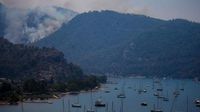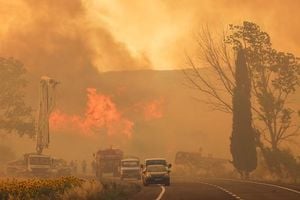In the early hours of June 3 and 4, 2025, a series of powerful earthquakes shook the eastern Mediterranean, striking parts of Greece and Turkey and leaving a trail of panic, injuries, and tragedy. The most significant tremor, a magnitude 6.2 earthquake, struck just 16 miles off the coast of Rhodes, Greece, at around 12:30 a.m. local time on June 3. This was followed by a 5.8 magnitude quake near Marmaris, a popular Turkish resort town, at 2:17 a.m., which caused the most severe human impact.
The seismic events were felt across a broad region encompassing Greece, Turkey, Syria, Egypt, and other neighboring countries, underscoring the Mediterranean's notorious seismic activity. Residents and tourists alike were jolted awake by the violent shaking, with many recounting harrowing experiences of buildings swaying and objects crashing down.
Tragically, the panic induced by the tremors led to the death of a 14-year-old girl, Afranur Günlü, in the town of Fethiye, Turkey. According to the Turkish Interior Minister, Ali Yerlikaya, Afranur suffered a panic attack during the earthquake and despite medical intervention, she could not be saved. The Governor of Marmaris, Idris Akbiyik, expressed his condolences, saying, “I wish God's mercy upon our deceased Afranur child and offer my condolences to her family.”
In addition to this heartbreaking loss, at least 69 people were injured in Turkey, primarily in the Mugla province, as residents jumped from windows and balconies in a desperate bid to escape the shaking buildings. Fourteen of these individuals were treated on-site, eight were discharged after outpatient care, and 46 remained hospitalized. Despite the injuries, initial assessments revealed only minor structural damage, such as cracked walls in two buildings in Marmaris, with no reports of significant destruction.
The quake’s depth played a crucial role in limiting surface damage. The European Mediterranean Seismological Centre (EMSC) reported the earthquakes originated approximately 68 kilometers (42 miles) underground. Greek seismologist Efthimios Lekkas, president of the Greek Earthquake Planning and Protection Organisation, explained that the quake's depth meant it was felt over a wide area but would not cause significant surface damage or trigger a tsunami. He reassured the public, stating, “We are in no way worried about these earthquakes. This one was intense due to its depth, it covers a larger surface area, but the seismic waves do not have the energy they should have to see damage on the surface.”
Rhodes, the largest of the Dodecanese islands and located about 18 miles south of the epicenter, felt the quake strongly. Tourists reported waking up to violent shaking, with some evacuating hotels to open spaces before returning once it was clear that there was little damage. Holiday provider TUI sent urgent messages to tourists in the region advising them to “remain calm and follow any safety instructions provided by your accommodation or local officials.” One British tourist shared on social media, “My best friend is out in Rhodes and not long been woken up by a 6+ magnitude earthquake.”
Meanwhile, in Turkey, the panic was more pronounced. Videos circulated online showing people fleeing restaurants and climbing over garden bushes to escape. A mother in Armutalan, about 21 kilometers from the epicenter, described the quake’s impact on her home: “I was asleep in bed with my daughter, the whole bed started shaking, the lights were flashing on and off, glass smashed.” She added that plaster tore from the walls and that she witnessed “big cracks,” leaving her petrified.
The earthquake also triggered a series of aftershocks ranging from magnitudes 1.2 to 3.2, further unsettling residents. However, no tsunami warnings were issued by either the Greek National Observatory of Athens or Turkey’s Kandilli Observatory and Earthquake Research Institute.
The seismic activity in the region is part of a broader pattern. In May 2025, a magnitude 6.1 quake struck off the coast of Crete, prompting tsunami alerts and minor landslides but no serious damage or injuries. Earlier in February, the island of Santorini experienced a week-long sequence of smaller quakes. The Mediterranean region’s seismicity is largely due to tectonic activity along fault lines such as the Hellenic subduction zone in southern Greece and the North Anatolian Fault Zone in western Turkey.
Despite the recent tremors, travel to the affected areas remains operational and largely safe. The Foreign, Commonwealth and Development Office (FCDO) has not updated its travel advice for Turkey or Greece in response to the earthquakes. Flights to and from Turkey and Greece continue without disruption, although Mugla Dalaman airport temporarily suspended flights after a crack was discovered on the runway, with some flights diverted to nearby airports in Bodrum and Antalya.
Tour operators are advising travelers to remain vigilant but calm. TUI emphasized the importance of following local safety instructions and reassured tourists that, at present, there is no indication of widespread damage or ongoing danger. Holidaymakers, however, expressed mixed feelings; some were frightened by the experience, with one stating, “We are about to fly tomorrow. Now I worry if it is worth it, and if to stay at home.”
The 2025 earthquakes come on the heels of a devastating 7.8 magnitude quake in 2023 that struck southern Turkey, killing over 53,000 people and causing widespread destruction across 11 provinces. That event also affected northern Syria, where around 6,000 people lost their lives. The region’s vulnerability to seismic disasters remains a pressing concern for residents, authorities, and visitors alike.
As authorities continue to assess the situation and monitor aftershocks, the resilience of communities in this seismically active region is being tested once again. The tragic loss of young Afranur Günlü serves as a somber reminder of the human cost of such natural disasters, even when the physical damage may be limited. For now, experts urge calm and preparedness, emphasizing that while earthquakes are inevitable here, the worst can often be mitigated through awareness and swift action.





